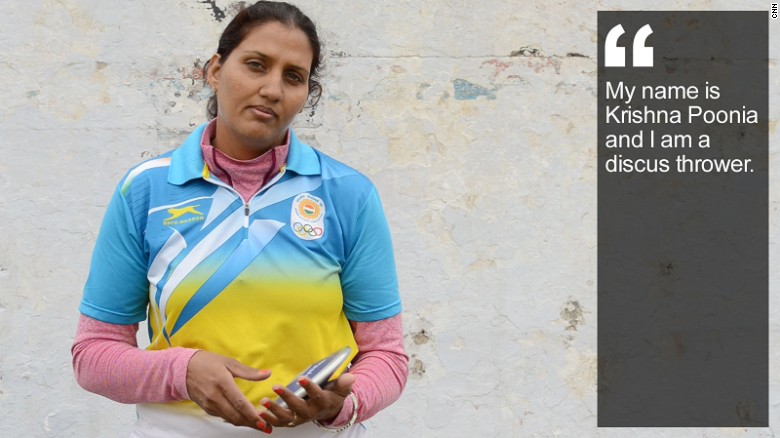It's a story that could have borrowed some of its plot from a Bollywood movie, but audiences might have scoffed at the improbable ending Krishna Poonia achieved in real life.
A script containing some classic storytelling themes -- poor rural upbringing, family tragedy, arranged marriages and political ambitions -- was afforded its defining element when Poonia put in an historic performance at the Commonwealth Games held in 2010.
In the entire 80-year history of the quadrennial sporting jamboree, no Indian female had ever claimed gold in a track and field event until Poonia snatched a momentous victory in the women's discus.
Her winning throw of 61.51 meters led an Indian clean sweep in the event (compatriots Harwant Kaur and Seema Antil took silver and bronze respectively) and also ensured India's first win in the athletics stadium since the runner Milkha Singh, known as "The Flying Sikh," dashed to gold in the men's 440 yards at the Games held in Cardiff, Wales way back in 1958.
"I can never forget that moment when I won the gold medal and when I took the victory lap with the flag," Poonia told CNN's Human to Hero series.
"For four years I was seeing the moment in my dreams and now I was finally seeing it in reality," she added wiping away tears from her eyes.
Poonia could be forgiven for welling up given her journey from provincial backwater to a packed stadium in New Delhi.
Born in the small town of Agroha in the state of Haryana, Poonia was brought up in by her father and grandmother after her mother died when she was just nine years old.
Living among the Jat people -- a traditional agricultural community in northern India -- Poonia recalls a childhood where physical fitness was honed working the land not at play on a sports field.
"Most people are agriculturalist and their routine is to get up early and feed the livestock and after breakfast they leave for the fields," she explains.
"My family had a milk dairy and we had around 70-80 buffalo. The work of the milking was only done by the family ... and when I was (15-16 years old) I would help, milking seven to eight buffaloes in one go."
School afforded something of a respite from this routine as well as providing an outlet for her growing interest in sport which was exercised further as she continued her formal education.
"When I got to college I used to compete with the other girls. My height and strength was good -- I could throw well," she explains.
The perfect arrangement
It was during this time that she got married, but rather than strangling her sporting ambitions, wedlock set them free.
"In our community we mostly have arranged marriages, but by the grace of god or luck my husband was a sportsman," she said.
Virender Singh had been a promising junior hammer thrower who had won medals at Asian Youth Games before injury forced him into early retirement. But when he married Poonia his sporting energies were revitalized as he applied himself to the role of husband and coach.
"After getting married to Virender, I got to learn a lot -- he knew about the Asian Games, the Olympics and knew what it meant to win medals ..." she said.
"When he told me about it I thought that I should be a part of it as well."
With his knowledge and his unflinching support -- "he had 100% belief in me," she says -- Poonia set about trying to achieve her newly-discovered sporting goals.
There were setbacks along the way -- a back injury in 2000 almost finished her career and the birth of a son the following year meant she had to juggle parental responsibilities alongside training - but her commitment paid off in the long run.
Bronze medals at the 2006 and 2010 Asian Games preceded her historic gold medal performance at the Commonwealth Games.
More records were broken two years later at the London Olympics when Poonia became the first Indian woman ever to reach the Olympic discus final, eventually finishing a creditable sixth.
Leveling the playing field
The 32-year-old has since used her sporting fame to good effect away from the discus circle helping the Rajasthan state Health Ministry in their campaigns to curb the ongoing curse of female foeticide.
The selective abortion of female fetuses is a continuing problem in India, and is particularly prevalent in Haryana where Poonia grew up, according to UNICEF.
She has also been actively involved in trying to improve sporting facilities for children in Jaipur, where she lives with husband and their 13-year-old son, and across the country.
"If you see the schools we have in India there is no ground or fields for the kids to play in. Physical (education) isn't given much importance. It is said that childhood grows as you play and that's how sport starts," she says.
"I came from a village. If I can reach (the top) level then why can't other girls from villages do that," she says.
Poonia's attentions have switched to politics in recent years, joining the center-left Congress party -- headed by Sonia Ghandi -- in 2013 and it looks like the final chapters of her sporting script may be being penned now, although she's keen to compete at the Rio Olympics next year.
But the narrative that seeks to re-write traditional attitudes towards women in wider Indian society is only just beginning.
"For a very long time, the culture of our country has been a very male dominating one and the male child has been given a lot of importance," she says.
"Until the time we are not able to abolish the discrimination of a boy and a girl within the family this thing will continue -- (a child's) thinking develops from this situation."
Poonia also advocates that dowries -- which are officially banned in India, though gifts to grooms and his family are still common -- should be put towards a girl's education so "she is able to stand on her own two feet," she says.
"They say the first teacher is the mother. If she is educated she will give good virtues to her children she can change the atmosphere of her house. The base of our society starts from there."
Few would argue with that assertion.
(CNN)
ANN.Az
Follow us !











